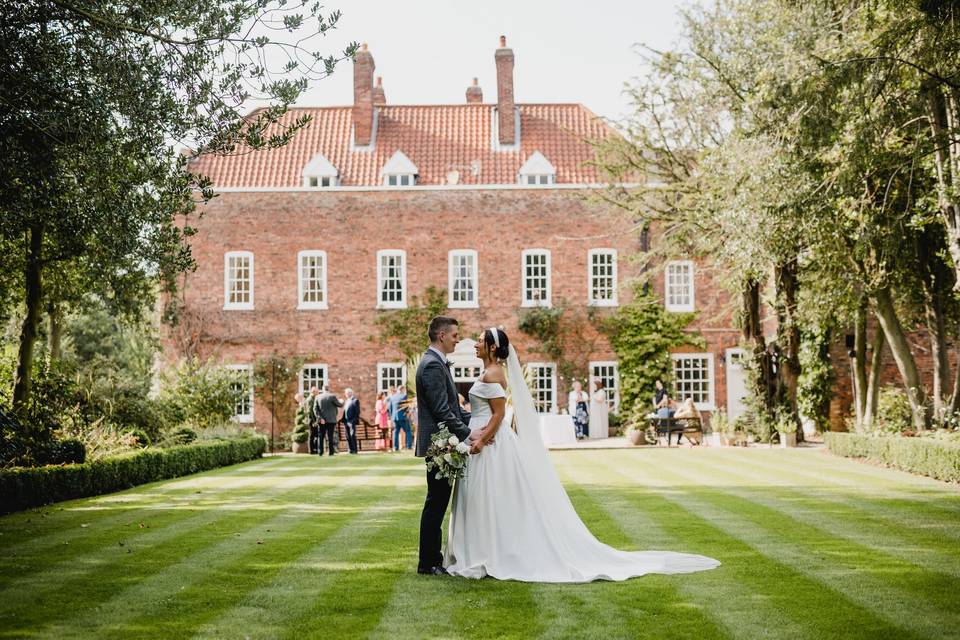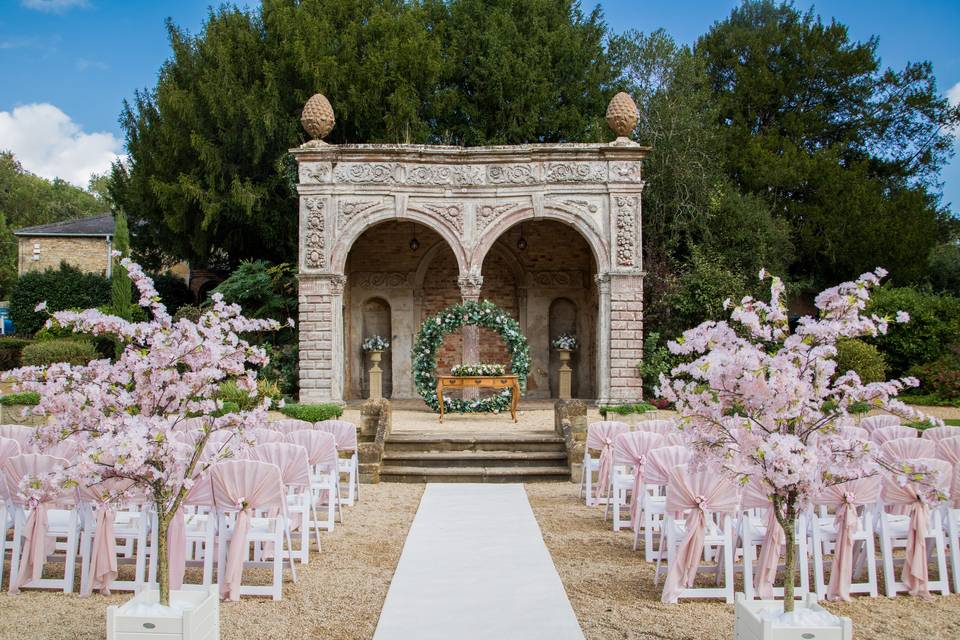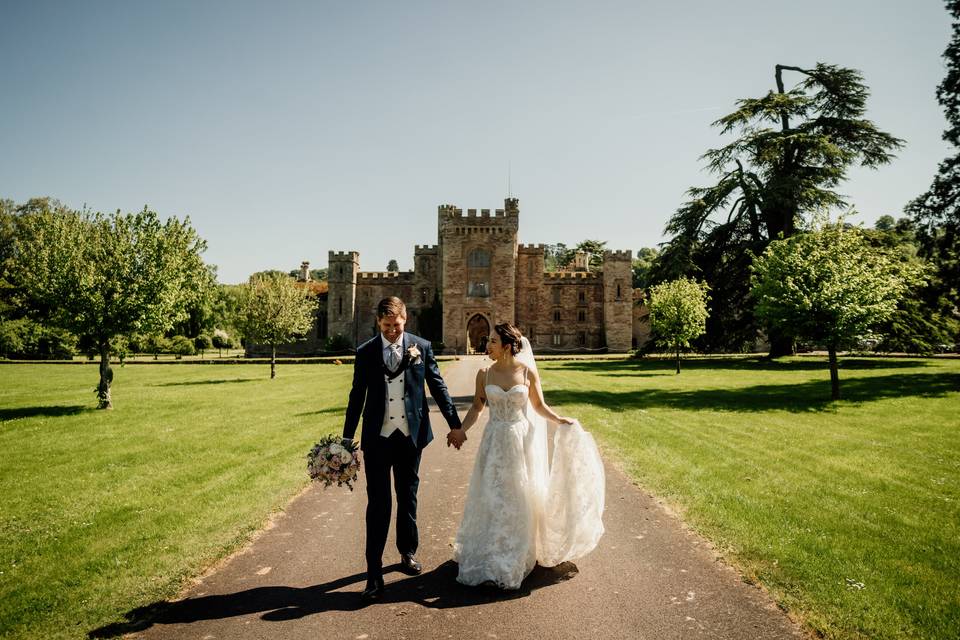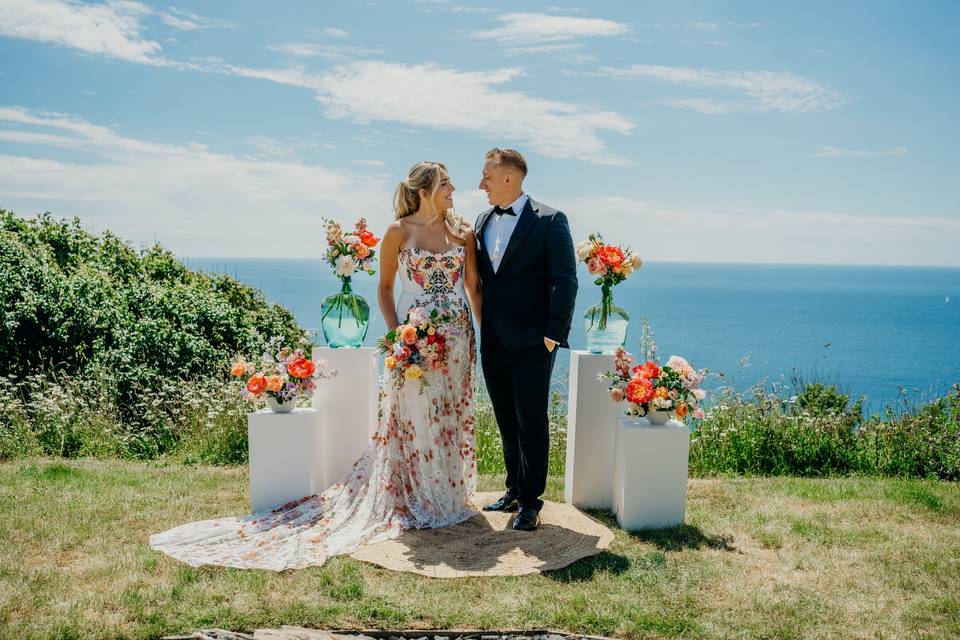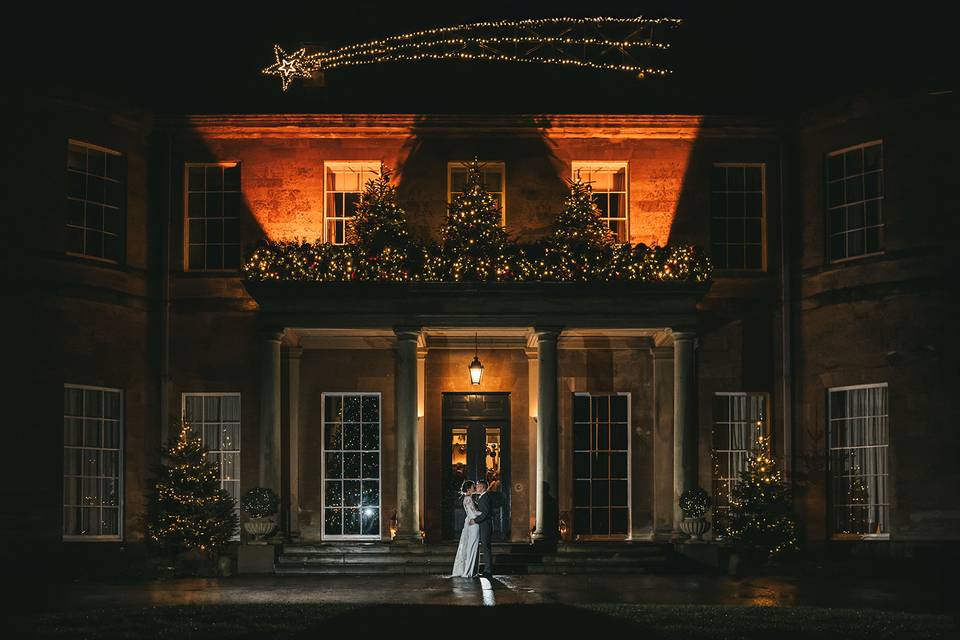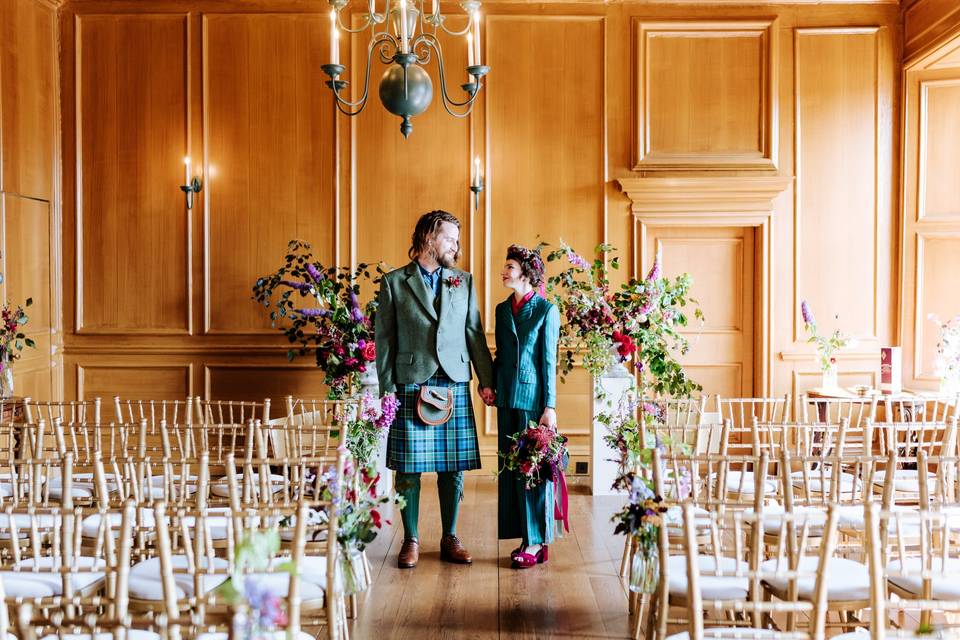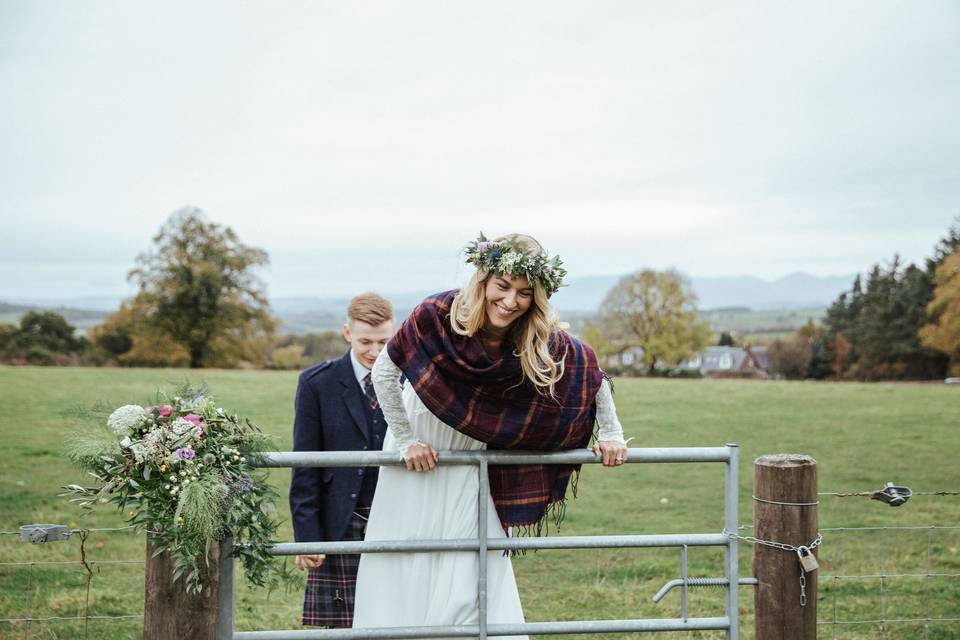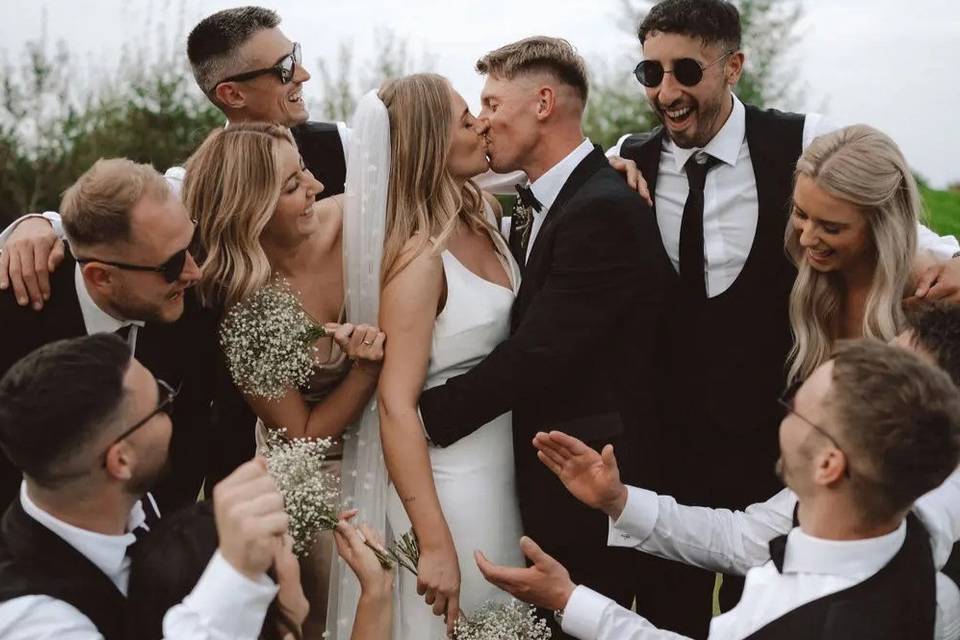Everything You Need to Know About Wedding Celebrants
Celebrant-led weddings have boomed in popularity in recent years - but what is a celebrant and what do celebrant weddings involve?
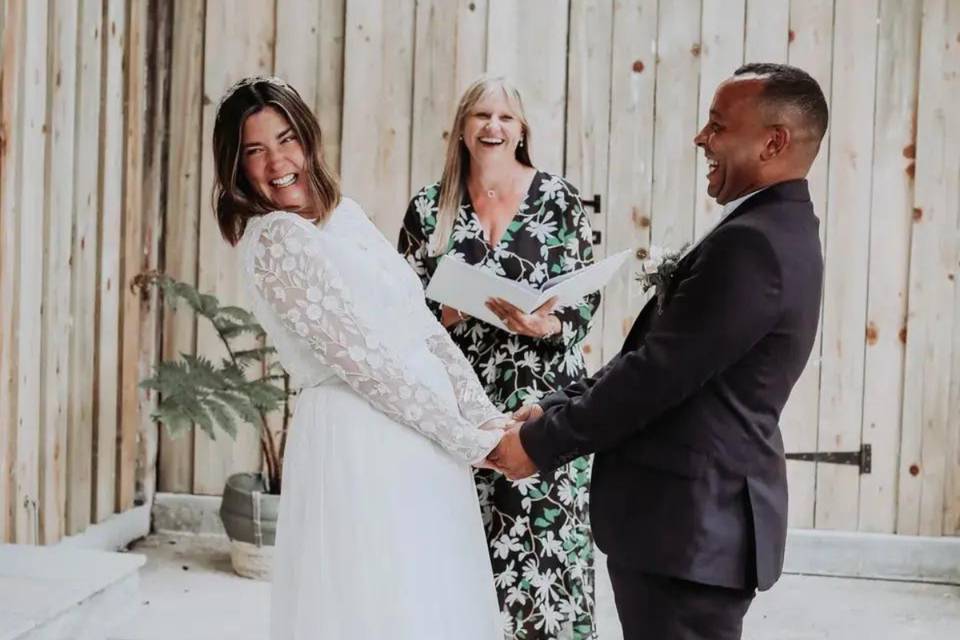
Are you planning a wedding that's as unique as you are? While many couples typically consider two traditional options— a religious ceremony or a civil ceremony conducted by a registrar—there’s a third, increasingly popular choice: getting married by a wedding celebrant who can personalise your ceremony to reflect your individual style and values.
If you've always wanted to get married under the stars, on a beach, among beautiful gardens, beside castle ruins or at your own home, a celebrant is the choice for you. Religious and civil ceremonies can feel very limiting for some couples, which is why they turn to a celebrant-led wedding that is personal, flexible and as formal as you'd like.
If you're interested in learning more about wedding celebrants, here's you ultimate guide to what they do, the legalities and practicalities, and how to find the right celebrant for you.
Your Essential Guide to Planning a Wedding Celebrant Ceremony
Planning a wedding is an exciting journey filled with choices that reflect your unique love story. It’s one of the most meaningful decisions you'll make is how to celebrate your special day. So, to help with this we're diving into the vibrant world of celebrant weddings and answering all your burning questions.
Ever wondered what a wedding celebrant is or what makes a celebrant wedding so special? Curious if a celebrant can legally tie the knot for you or if those heartfelt vows are actually binding? We’ve got you covered! We’ll break down the key differences between a celebrant and a registrar, show you the ins and outs of becoming a wedding celebrant yourself, and even explore whether you need any qualifications to join this exciting profession. By the end of our journey together, you’ll be ready to embrace the magic of celebrant weddings and make your special day truly unforgettable!
With plenty to discover and learn, don't hesitate to dive directly into the section that piques your interest.
- What is a Wedding Celebrant?
- How Do We Choose a Wedding Celebrant?
- What is the Difference Between a Celebrant and a Registrar?
- How Much Does a Wedding Celebrant Cost?
- What Are the Benefits of Choosing a Celebrant Over a Civil Ceremony with a Registrar?
- What Happens During a Celebrant-Led Wedding?
- Is a Celebrant Wedding Legally Binding and Can a Celebrant Legally Marry You?
- What Can We Expect to Happen Once We've Chosen a Celebrant?
- How Long Before the Wedding Should We Book Our Celebrant?
- How to Become a Wedding Celebrant?
- Do you Need a Qualification to be a Wedding Celebrant?
What is a Wedding Celebrant?
A wedding celebrant is a trained professional who specialises in creating and officiating personalised wedding ceremonies. As well as officiating weddings, some celebrants also perform vow renewals, baby naming ceremonies and funerals.
Unlike traditional officiants, such as religious leaders or registrars, wedding celebrants work closely with couples to design a ceremony that reflects their unique love story, values, and preferences.
This can include customising vows, incorporating special rituals, and choosing the location and tone of the ceremony. Celebrants often focus on making the experience intimate and meaningful, ensuring that every couple's vision for their wedding day comes to life, whether it’s a grand celebration or a simple gathering.
What’s also unique about wedding celebrants, is that they do not have to follow templates or 'tick boxes' meaning couples will have complete creative freedom to make their day how they want it to be - what’s not to love!
Humanist Wedding Celebrant Vs Independent Wedding Celebrant
When it comes to celebrants, you may have heard of two main types: humanist wedding celebrants and independent celebrants (also known as civil celebrants), each catering to different couples.
In simple terms, humanist celebrants conduct weddings within the Humanist belief system, focusing on values like compassion, reason, and equality. On the other hand, independent celebrants operate outside any specific belief system, offering flexibility to incorporate religious or spiritual elements into the ceremony if desired.
Independent celebrant Sarah Noble explains that she performs weddings for couples of all beliefs and none: "Couples can be mixed faith, no faith, interfaith, humanist, gay or straight, traditional or modern, spiritual but not religious. For a truly heartfelt ceremony; love is all you need."
Humanist celebrants, in contrast, perform weddings primarily for Humanists or those who identify as non-religious. Most of these ceremonies won't include religious elements like prayers. However, humanist celebrant Laura Gimson emphasises that their ceremonies are always warm and welcoming to everyone, regardless of faith, and celebrate a couple's background and culture in meaningful ways.
"You don’t have to identify as a Humanist to have a Humanist wedding," says Laura. "Almost everyone finds values that align with Humanism. It’s about making the most of the one life you have and being good without God."
How Do We Choose a Wedding Celebrant?
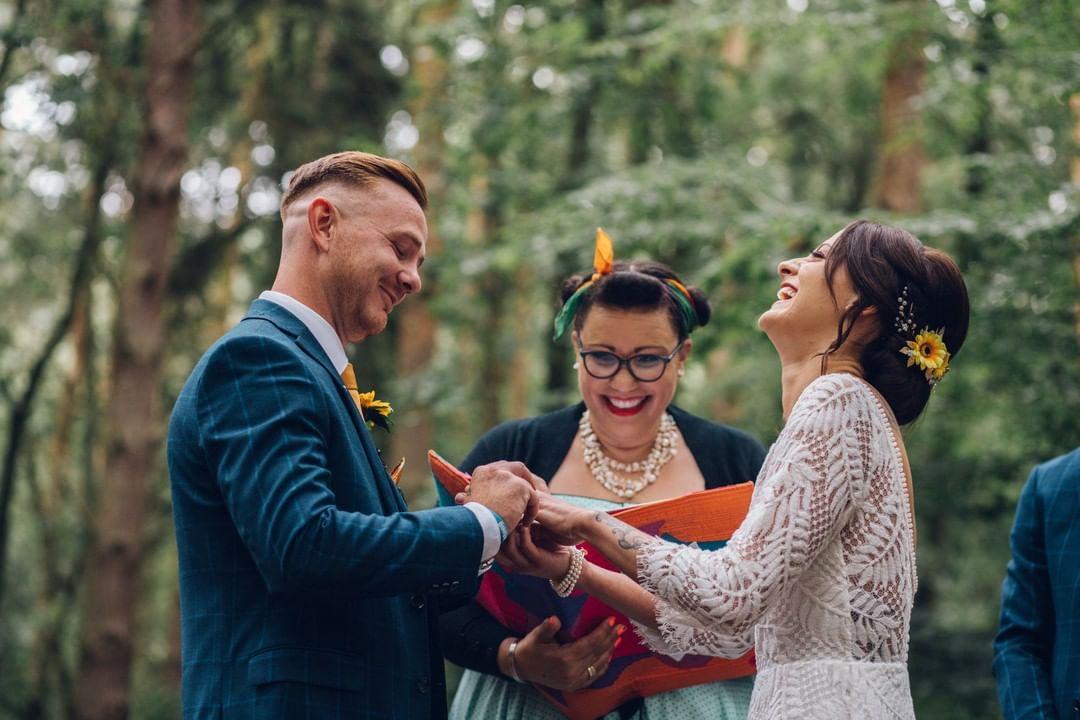
Choosing a celebrant for your wedding is an exciting process, and there are a few key factors to consider to ensure you find the perfect fit. Start by reflecting on the type of ceremony you envision—do you want something traditional, modern, or perhaps a blend of both? Once you have a clear idea, search for a wedding celebrant near me to explore local options.
Check out their websites and social media profiles to get a sense of their style and personality. It's also a great idea to read reviews from previous couples to gauge their experiences. When you have a shortlist, schedule meetings or consultations with your top choices to discuss your vision, ask questions, and see if you connect on a personal level.
Remember, this is someone who will play a significant role in your special day, so finding a celebrant who resonates with you is essential. You can also take a look at our full list of hitched registrars here to ensure you're considering all your options for your wedding celebration!
"No one will remember the colour of the chair sashes but they will remember how your celebrant made them laugh and cry and created the most wonderful and individual ceremony for you," says Independent celebrant Michelle Taylor. She also suggests that Google is a great go-to and has the following advice:
- "Decide if you want an Independent celebrant, a Humanist, Spiritualist, Pagan or Church-affiliated celebrant. There are a lot of different ones out there! Don't just look for 'Humanist' when you do your search, instead search for 'celebrant' - it really opens up your field of choice."
- "Ask your other suppliers, especially the photographers. They love working with celebrants on the whole because we are different!"
- "Go on recommendations from friends and family, especially if they have recently attended a celebrant-led ceremony."
- "A lot of us are on social media, so that's a good place to browse, follow us, interact with us and see if what we are posting appeals to you."
"Once you have a short list, look at their website and see if their personality shines out to you," she recommends. "Have they got video, photos, testimonials?" Remember celebrants who are just starting out won't have this but it doesn't mean they aren't right for you!
Next, "drop them a line or give them a call...we like talking!" says Michelle. "Ask questions. A good celebrant won't be shy in coming forward and will probably be able to answer all your questions before you actually ask them!"
We recommend you look for a celebrant who is accredited by a professional body, like the UK Society of Celebrants or Humanists UK, as they'll have undertaken professional training.
What is the Difference Between a Celebrant and a Registrar?
In the UK, the difference between a celebrant and a registrar is like choosing between a handcrafted piece of art and a mass-produced print—both can be beautiful, but one is uniquely yours!
A registrar is a government official who conducts legally binding marriage ceremonies within the framework of civil law. They typically perform weddings at registered venues or designated locations, following a standardised script to ensure all legal requirements are met and marriage certificates are issued. In contrast, a wedding celebrant in the UK is your creative partner in crafting a personalised and memorable ceremony.
They specialise in celebrating love in a way that reflects your unique story, values, and personality, allowing for greater flexibility and fun. Celebrants can conduct ceremonies in various locations—think picturesque gardens, serene beaches, or even your favourite local spot—without the restrictions of registered venues.
Many couples opt to blend the best of both worlds: a celebrant-led ceremony that brings all the warmth and individuality, paired with a registrar to handle the legal aspects, and we love it!
How Much Does a Wedding Celebrant Cost?
The cost of hiring a celebrant can vary significantly based on factors such as experience and geographical location. Generally, celebrants may charge anywhere from £450 to £1,300. For local weddings, prices often start around £675, which typically includes all meetings, the writing of the ceremony, rehearsal, printing, and the delivery of the ceremony itself.
When selecting a celebrant, it's important not to be solely influenced by price. Investing in a quality celebrant can make a huge difference in your wedding experience. After all, without a well-crafted ceremony, there is no wedding!
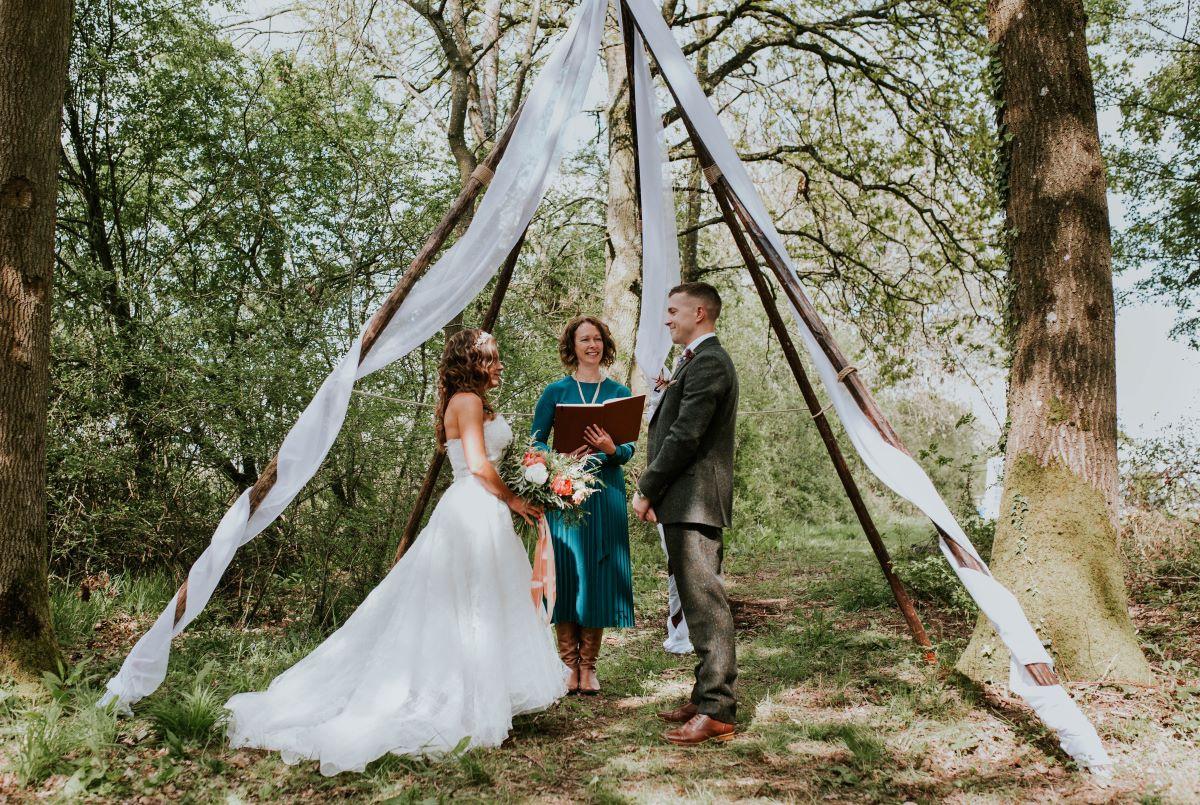
What Are the Benefits of Choosing a Celebrant Over a Civil Ceremony with a Registrar?
When considering what type of ceremony to have for your wedding, the benefits of choosing a celebrant over a civil ceremony with a registrar can be significant, so listen up!
When you marry at a licensed wedding venue or a registry office, a registrar will perform your legal civil ceremony. However, registrar weddings often come with rules, regulations, and red tape that can limit your options. For example, you may not be able to share personalised vows, bring in decorations, or use specific music that resonates with your love story. Additionally, registrars often have multiple weddings to attend in a single day, which means your time with them may be quite restricted.
In contrast, a celebrant wedding offers the exact opposite experience. As Laura, an experienced celebrant, puts it, "You have absolute creative freedom. Your ceremony is written with you and only you in mind." A celebrant takes the time to get to know you as a couple, guiding you to make authentic and meaningful choices. This collaborative approach means you can involve all your favourite people and craft a ceremony that truly honours your love.
Another significant advantage is the relationship you build with your celebrant. Unlike being assigned a registrar, you choose your celebrant based on comfort and connection. This person understands your vision and values, ensuring your day is unique and personal. Independent celebrant Michelle Taylor emphasises this individuality, stating, "We are lucky; we get to know our couples and are very rarely time-poor. We aren't rushing off to be somewhere else. Each ceremony is personal to the couple; it's not an 'insert name here' template."
Celebrants also offer the flexibility to incorporate various elements into your ceremony. As Michelle notes, "As an independent celebrant, I can add in religion if required. I certainly like to dress up and am happy to theme a ceremony. Pets are allowed, and most requests for symbolic elements can be accommodated." The only limitations are personal preferences; some celebrants might humorously decline to jump out of a plane or get naked, but many will embrace almost any creative request!
Ultimately, choosing a celebrant allows for a much more tailored experience, filled with personal touches and creative expression. It’s about making your wedding celebration a true reflection of who you are as a couple, ensuring that your special day is as memorable and meaningful as possible.
What Happens During a Celebrant-Led Wedding?
A celebrant wedding ceremony is a truly personalised experience, designed to reflect the unique love story of the couple getting married. With a celebrant wedding script tailored specifically for you, your ceremony can capture every special moment that matters.
"I cannot stress enough – no two celebrant-led ceremonies are ever the same!" says Laura. "And they are free of restrictions," she adds. "It can take place anytime and anywhere that has meaning to you— a forest, a garden, a cliff overlooking the sea, a narrowboat, a cinema, a ski slope; just say the word, and we’ll be there in our finest garb!"
So, basically, it really is up to the couple! However, that being said, there are elements that most will include, although some may choose a symbolic act over the exchange of rings and vice versa. Typical components of the celebrant wedding script may encompass:
- Arrival of the couple
- Introduction and welcome
- Reading or poem
- The couple's love story
- Another reading, poem, or song
- The couple's vows
- Symbolic act (optional, but couples may like to perform a ritual like hand-fasting, unity sand ceremony, or candle ceremony)
- Exchange of rings
- Pronouncement of marriage
- Closing and departure
Just How Unique Can Our Wedding Be?
Utterly unique, seriously! Here's a few of the weddings our celebrants have done and you can see how the couples have embraced their passions and chosen venues special to them.
- A Harry Potter themed wedding where Michelle was "Dumbeldora" (pictured above) and waved her magic wand over the happy couple.
- Freddie and Mathias were married by Laura on the back of a wooden wagon built by the bride's dad and overlooking a lake. They arrived in an open top vintage Land Rover and drove down the aisle to 'March of the Valkyries'. Friends and family then joined them to help with their hand-fasting.
- Michelle was the celebrant at a Bletchley Park, 1940s-themed wedding where a crossword was included as part of the ceremony
- At Sarah and Phill's wedding, they took the brave step of asking their guests to share why they thought they were a perfect match. They wrote their answers on cards and during the ceremony they all picked out a handful of them to share. "Admittedly, it added an element of risk but it also gave us some of the biggest laughs!" says Laura.
- Laura hosted one wedding in the centre of a circle of Poplar trees in the garden of couple Sarah and James' family home. James had felled a branch of one of the trees and inlaid pieces in their wedding rings. "As they exchanged them, they shared vows about how their wedding bands weren’t about status – they weren’t meant to be shiny and perfect and they weren’t a symbol of ownership. Instead, their rings would serve as a reminder of the exact place and time that they made the choice to live their lives side by side."
Is a Celebrant Wedding Legally Binding and Can a Celebrant Legally Marry You?
This depends on which part of the UK you are in and the type of celebrant.
Humanist celebrants who are accredited by Humanists UK are able to perform legally binding weddings in Scotland, Northern Ireland and Jersey. They are currently not legally recognised in England and Wales, although they are campaigning hard for this. Independent celebrants cannot perform legally binding weddings in the UK.
Don't let this put you off! All that's required is that the couple make the standard legal declarations and register their marriage with a registrar. You can do this either before or after your wedding day at your local registry office, it takes about 15 minutes and can cost from as little as £46 plus the cost of the marriage certificate (usually £11). You will need two witnesses for the marriage ceremony (no witnesses are required for a civil partnership registration) and there is no time limit on when it can be done.
Couples consider the day they host their celebrant ceremony and reception to be their "real" wedding day, not the day of the formal registration. Humanist celebrant Rachael Meyer compares it to registering the birth of a child - we celebrate the baby's day of birth, not the day they were legally registered.
"A wedding ceremony is a sincere but joyful, public commitment of love in the presence of friends and family– the legal recognition of the ceremony is just a formality!" she adds.
What Can We Expect to Happen Once We've Chosen a Celebrant?
You might book your celebrant a year before you wedding day, so what actually happens between then and standing before your loved ones at the ceremony?
1) Discovering Your Love Story
Each celebrant will write a script for their couples; this tells the couple's story - of how they met, fell in love, their shared values, and their hopes for the future - and it is the first task for the celebrant.
How each celebrant goes about this will be different, but most will have face-to-face meetings with couples, phone calls, email conversations or a mixture of all three.
Michelle meets her couples face to face (where possible) before they book her and starts garnering information about them. She also uploads a questionnaire for each couple to fill in on her website and once she's got it back (usually three months before the ceremony), she starts to write the first draft. This is where celebrants come into their own: they will throw themselves into researching the finer details of your love and finding music, poems and readings that reflect you.
2) Writing a First Draft
"Once I have completed a first draft I will always send it to my couples," explains Michelle. "I would hate to have for a tiny detail wrong and for it not to have been checked over. That said, depending on how much free rein I have been given, I may well have roped in family members and friends to provide me with the secret gossip on our happy couple. And this, of course, will remain a secret until the big day. I LOVE including little bits and pieces from their loved ones as it really add an extra element to the ceremony.
3) Preparing for the Ceremony
"Once the script is signed off, I will print a copy for me, a keepsake copy for the couple, certificates, vows, readings etc and they'll all be packed away in a keepsake box along with a few little goodies for the couple for the morning after.
"I like to conduct a practice with all the key players so everyone knows their cues and it also helps ramp up the excitement...as if it needs ramping up!"
4) Meeting You on the Day
<0>"On the day, I will be at the venue at least an hour before the ceremony, along with portable amp and mic if needed, and mingle with the guests, calm nerves and generally prep for the ceremony.
"I never rush off and 99% of the time will only do one ceremony per day. There are a few odd occasions when two are feasible but they are very, very rare! I love putting my energy and time into each ceremony and invariably am driving home afterwards with a big grin on my face."
How Long Before the Wedding Should We Book Our Celebrant?
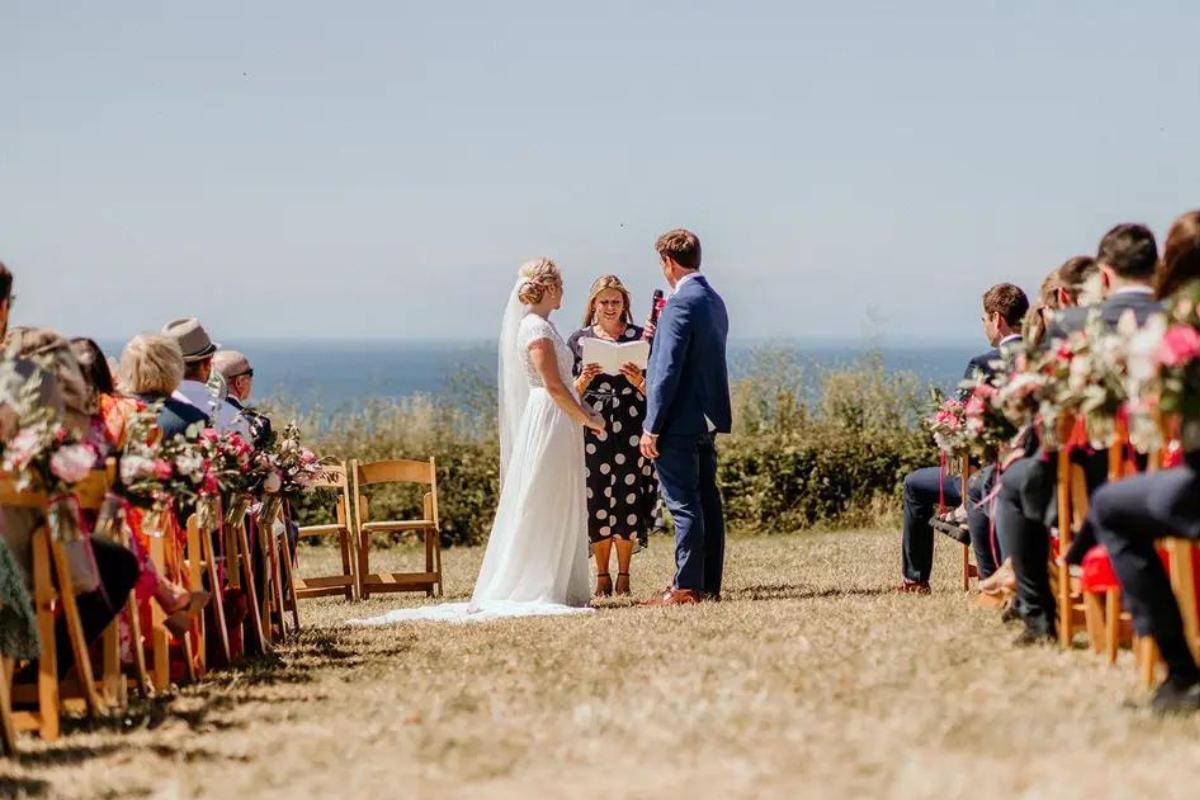
Independent celebrant Sarah says she is often booked up a year in advance so it's best to work out whether you want a celebrant early on in the planning process. If you've already decided you want a non-traditional wedding venue then you'll know you need a celebrant, but there's plenty of other reasons to choose one too.
How to Become a Wedding Celebrant?
If you’ve ever thought about becoming a wedding celebrant (or even combining the role with being an MC), there are a few different ways to get started. The best part? You don’t need formal qualifications, although taking a training course can really boost your confidence and career prospects.
There are several private training options available, such as courses with Humanists UK, or programs like the Level 3 Certificate and Diploma in Celebrancy. These courses cover everything from wedding, funeral, and naming ceremonies to mastering public speaking—skills that come in handy if you're planning to be both an MC and wedding celebrant.
To thrive in this role, you’ll need excellent communication, organisational skills, and the ability to listen closely to couples and their needs. While experience in wedding or event planning can help, it's not essential. What truly matters is your ability to create unforgettable, personalised ceremonies and manage the energy of a room—perfect for anyone who loves being at the heart of celebrations.
Do You Need a Qualification to be a Wedding Celebrant?
Technically, you don’t need a formal qualification to become a wedding celebrant in the UK, but getting some wedding celebrant training is definitely worth it! While anyone can claim the title of celebrant, taking a proper course gives you the skills to create awesome, personalised ceremonies, guide couples through their special day, and confidently handle public speaking. Plus, you’ll learn how to make each ceremony as unique as the couple themselves.
In Scotland, if you want to officiate legal weddings, you’ll need to be accredited by an approved body, which usually means completing formal training. But honestly, a bit of training is helpful anywhere in the UK—whether or not you’re handling the legal bits.
Getting proper wedding celebrant training will set you apart and make you the standout choice for couples searching for someone to help them create unforgettable, personalised wedding moments!
Now that you're fully clued up on everything about wedding celebrants and celebrant-led ceremonies, why not take the next step and check out our list of Hitched suppliers? You might just find the perfect celebrant to make your big day truly unforgettable!


